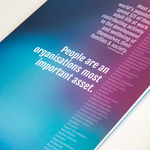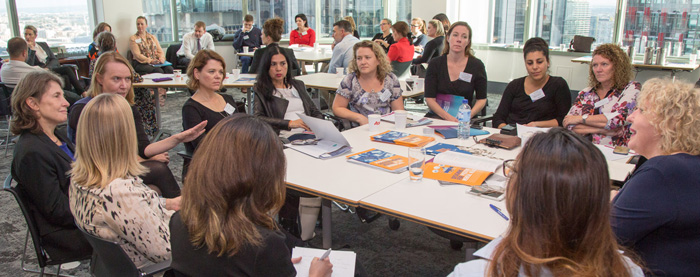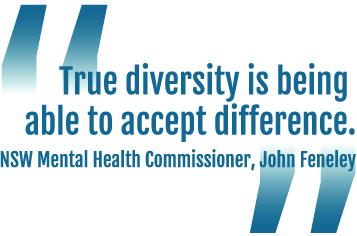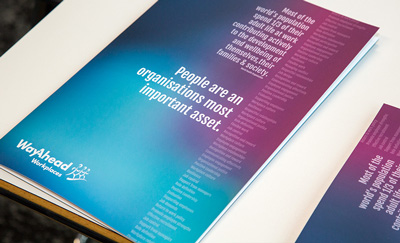WayAhead Workplaces Annual Forum 2017

Everyone in the workforce can think of a story either positive or negative where their place of work has had an impact on them. The kind of place where we work, socialise and spend a significant portion of our lives plays a huge role in our overall wellbeing. Workplaces are increasingly recognising this and turning their attention to what they can do to support their employees.

A multifaceted approach is key to improving wellbeing in the workplace, said representatives of the Commonwealth Bank and Optus, as well as leading academics at the WayAhead Workplaces Annual Members Forum. In fact it was central to the theme of the day “An Integrated Workplace Mental Health Approach: The Way Forward”. While network members meet throughout the year, the Annual Members Forum is a full day of exploring the latest in mental health and wellbeing in the workplace. Sharon Leadbetter, WayAhead Workplaces Co-ordinator, welcomes network members to the Forum to share learnings, connect with each other and further mental health and wellbeing in the workplace. This year, there were 99 attendees representing 54 organisations from around Australia.

Alice Klontzaris, of Commonwealth Bank Australia, with Rachel Clements, of the Centre for Corporate Health, spoke about measures that the Commonwealth Bank had put in place over the last few years to best support employee wellbeing. Starting from a single approach, they built up a suite of different mechanisms and programs to support employees across a large and geographically dispersed workforce. They identified the importance of leadership commitment in positioning employees’ mental health as a vital business imperative. With around 55,000 employees across more than 1300 workplaces in Australia, and more overseas, Commonwealth Bank identified the need to have a multifaceted approach to reach their employees, wherever they were. “When employees are reaching out to you to share their mental health journey, that’s what you want,” they said, “that’s where we are today.”

Geoff Hoad, of Optus, also spoke about the importance of considering a multiplicity of interventions. With a range of different employees in a range of different environments, from engineers in the field, to salespeople in storefronts to the varied positions in the head office, he said he saw such an approach as “covering all bases” rather than a scattergun approach. He also spoke about the fact that that work-life balance no longer exists because with new technology, such as smartphones, that distinction is meaningless. Organisations have responsibilities for their employees, regardless of the cause of ill mental health. “You’re not going to be able say ‘this is a workplace injury, that is not. So we’re not going to treat the other one.’ That person is part of your workforce,” he said.
“Consider a muliplicity of approaches to cover all bases. What connects with some, turns others off.” Geoff Hoad @Optus #workplaceforum2017 pic.twitter.com/RwKyzhqGWh
— WayAhead (@mentalhealthnsw) June 20, 2017
These insights into improving wellbeing were borne out by a team of researchers, including Dr Angela Martin, of Pracademia and Adjunct Professor at the University of Tasmania, who presented the findings of a paper on developing integrated approaches to mental health in the workplace. Dr Martin emphasised the importance of an interconnected, three-pronged approach: preventing harm, promoting the positive, and managing illness. She encouraged workplaces, whether large or small, to do what they could in each of these three areas, even if it was just one thing in each category.
Preventing harm, promoting the positive and managing illness key to effective workplace mental health @angelamartinphd #workplaceforum2017 pic.twitter.com/8wPCiLFrdW
— WayAhead (@mentalhealthnsw) June 20, 2017
The practical elements involved in improving mental health and wellbeing in the workplace were emphasised throughout the day. SuperFriend, a national mental health promotion charity, provided copies of a resource they had developed, outlining practical actions that employers and organisations can take to support employees. Deborah Kennedy, of SuperFriend, also spoke about the importance of safe, secure and supportive environments to allow employees to thrive.
Deborah Kennedy of @SuperFriendMHF on importance of promoting the positive for “safe, secure, supportive environments.” #workplaceforum2017 pic.twitter.com/MSt5odH8Kk
— WayAhead (@mentalhealthnsw) June 20, 2017
“Workers don’t have to be unwell or mentally distressed – or even officially mentally ill – for us to be doing something about it. Why are we waiting for bad things to happen?” said Sharon Leadbetter. “Why don’t we just get in there and help people by arming them with information and support to create happy, healthy and safe workplaces? Because the benefits are beyond this just being a good thing to do.”
Better awareness of mental health and support for wellbeing in the workplace is steadily increasing. Nonetheless it is an area where all organisations, no matter how large or small, can do more to support their employees. As Deborah Kennedy said, “it’s about all of us. About how we feel when we go home at the end of the day.”
To learn more about the program, head to the WayAhead Workplaces website.
 CORPORATE HEALTH PROVIDER EXHIBITORS
CORPORATE HEALTH PROVIDER EXHIBITORS
- Aon Hewitt
- Black Dog Institute
- Mad for Health
- Uprise
- SafeWork NSW
SPONSORS OF THE EVENT
- SuperFriend
- Optus (member)
- Springday (member)
- Endeavour Wellness (member)
- Davidson Trahaire Corpsych (member)
Newsletter
Stay up to date
Sign up to our Mind Reader newsletter for monthly mental health news, information and updates.